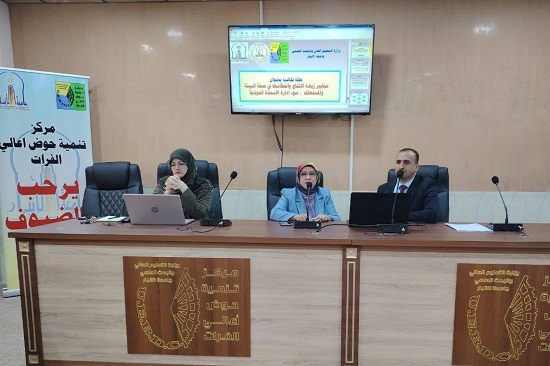|
Panel discussion entitled: Criteria for increasing production and their reflection on the health of the environment and the consumer
2024-10-10

The Upper Euphrates Basin Developing Centre - Human Resources Development Department, in coordination with the Continuing Education Centre at the Presidency of the University of Anbar, held a panel discussion entitled: (Standards for increasing production and their reflection on the health of the environment and the consumer ... Fertilizer mismanagement as a model). On Tuesday, 8/10/2024.
The seminar included three topics:
The first topic: a revolved around the importance of fertilizers, their classification, factors affecting their use, lectured by Prof. Dr. Bassam Ramadan Sarheed, a lecturer at the College of Agriculture / University of Anbar.
The second topic: revolved around plant nutrition and its reflection on the consumer (plant, animal, and human) for the entry of nutrients into the components of the food chain (plant, animal, and human) and their cumulative concentration in successive food levels and the extent of their danger to the consumer. Instructor Dr. Haneen Shartouh Sharqi, a researcher at the Upper Euphrates Basin Developing Centre / University of Anbar.
The third topic: It revolved around the excessive use of chemical fertilizers and their impact on the environment and humans, which cause an increase in the percentage of pollution in both soil and water due to the harmful elements left by fertilizers in the soil and in wastewater and groundwater, lectured by Assistant Professor Dr. Hala Arshad Ali, researcher at the Upper Euphrates Basin Developing Centre / University of Anbar.
The panel discussion came out with several recommendations to meet the growing demand for food, the most important of which are:
1. Increasing agricultural production to keep pace with the increase in population growth, through the investment of new areas, and the use of modern techniques for the use of chemical fertilizers and methods of adding them that help to intensify production in the same cultivated area.
2. The absence of chemical fertilizers additions without referring to soil inspection.
3. Avoid unbalanced addition of fertilizers (i.e. focusing on one element without the other) taking into account the fertilizer recommendation for each cultivated plant.
4. Recommending the use of environmentally friendly fertilizers such as organic and biological fertilizers and worm fertilizer.
#university_of_anbar
#Upper_Euphrates_Basin_Developing_Center


|